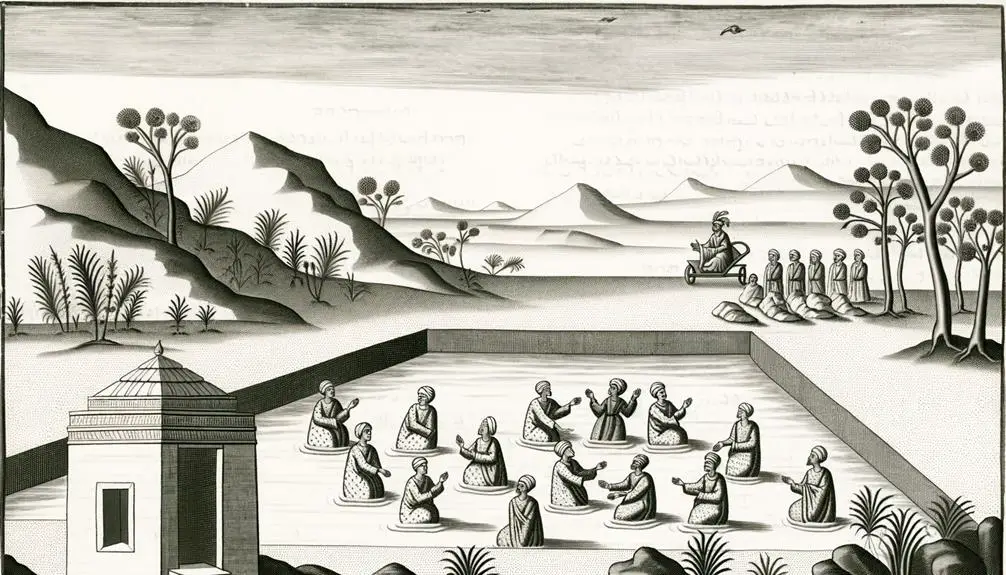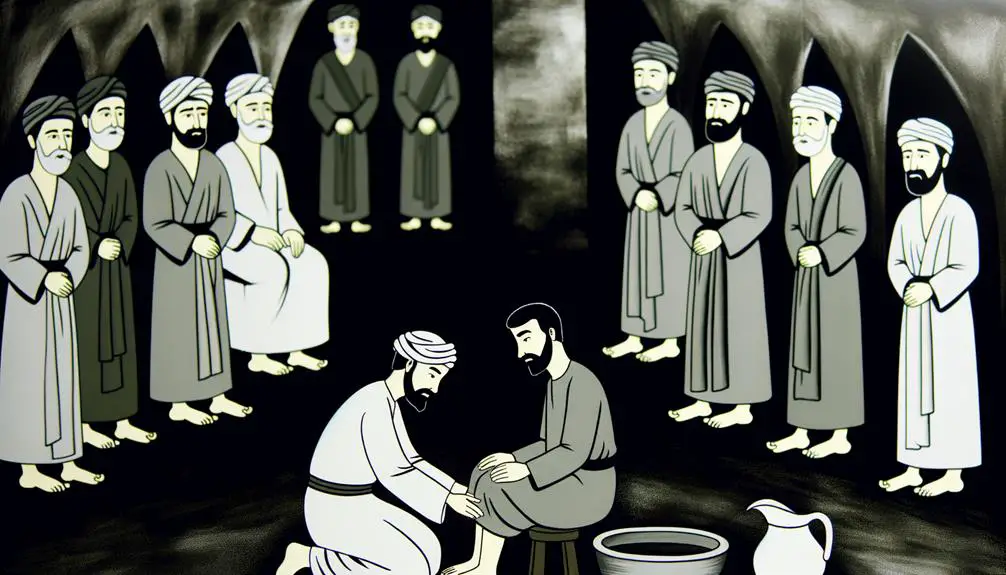Kneel into biblical tales of humility to unlock secrets of true leadership and wisdom, and discover how these stories resonate today.

Stories in the Bible About Humility
Isn't it intriguing how tales of humility in the Bible reflect the essence of true leadership and wisdom?
You'll find that characters like Moses, who led with unparalleled meekness, and Solomon, who sought wisdom over wealth, exemplify humility's power.
These stories, including David's respect for Saul, Naaman's journey to healing, Mary's submission, and Jesus's act of washing his disciples' feet, offer profound lessons.
As you explore these narratives, you'll uncover the transformative impact of humility on both personal growth and leadership.
The question then becomes, how can these ancient lessons shape your understanding of humility today?
Key Takeaways
- Biblical figures like Moses, David, and Solomon demonstrate humility in leadership through service, respect, and wisdom.
- Naaman's journey from pride to humility underscores the transformative power of humble acceptance for physical and spiritual healing.
- Mary and Jesus embody divine obedience and humility, challenging traditional leadership perceptions and highlighting servant leadership principles.
- Humility, as illustrated through biblical narratives, involves a dynamic, faith-driven surrender to a larger purpose, enriching both personal and communal life.
Moses: The Humble Leader

Despite his monumental role in leading the Israelites out of Egypt, Moses exhibited unparalleled humility, setting a precedent for leadership grounded in modesty and selflessness. Moses' meekness wasn't a sign of weakness but rather a testament to his strength and confidence in following God's will above his own. His leadership style, characterized by humility, serves as a profound lesson for modern leaders in various fields.
Analyzing Moses' interactions, you'll notice his reluctance to assume the role of a leader. He doubted his abilities and questioned his worthiness, yet, once he accepted the task, his leadership wasn't about self-promotion but about serving a purpose greater than himself. Moses' humility was evident when he interceded on behalf of the Israelites, despite their complaints against him. He placed the people's needs and well-being above his pride and personal grievances.
Furthermore, Moses' meekness was crucial in his dealings with God. He didn't claim to have all the answers or to fully understand God's plans but trusted and obeyed with humility. This aspect of his leadership style—his willingness to listen, learn, and adapt, guided by a higher purpose—demonstrates the power of humility in leadership.
In essence, Moses' leadership journey underscores the importance of humility in guiding others. His example reveals that true leadership isn't about asserting authority or seeking glory but about selflessly serving and uplifting those you lead. Moses' legacy, therefore, isn't just one of liberation but of demonstrating how humility can be the foundation of effective, compassionate leadership.
David's Respect for Saul
David's unwavering respect for Saul, even in the face of unjust persecution, exemplifies a profound degree of humility and reverence for God's anointed authority. Despite Saul's jealousy driving him to seek David's life, David's loyalty to the king never wavered. This dynamic showcases a complex interplay between human emotions and divine ordination, offering a rich tapestry for analysis.
From an analytical standpoint, Saul's jealousy emerges as a natural, albeit destructive, human response to perceived threats to one's status and authority. David's rise as a favored warrior and leader among the Israelites stoked the flames of Saul's envy. Yet, it's David's response to this adversity that marks a pivotal moment in biblical narratives about humility. Instead of succumbing to bitterness or seeking revenge, David chooses a path of respect and restraint, recognizing Saul's divine appointment as king.
This decision reflects a deep-seated belief in the sovereignty of God over human affairs. David's loyalty, therefore, isn't merely a personal choice but a theological statement. He acknowledges that it's not his place to harm God's anointed, a principle that underscores the biblical ethos of humility and submission to divine will.
Scholarly examination of this narrative highlights the nuanced understanding of humility as not just a moral virtue but a form of worship and acknowledgment of God's ultimate authority. David's respect for Saul, despite the latter's flaws and hostility, becomes a testament to the power of humility to transcend personal grievances and uphold a higher moral and spiritual order.
Solomon's Request for Wisdom

In the heart of biblical narratives on humility, Solomon's request for wisdom stands as a profound exploration of the interplay between divine favor and human agency. It's nestled within a king's dream, where Solomon, newly anointed and acutely aware of his inexperience, encounters the Divine. Faced with an offer that could have easily led to a request for wealth, long life, or the demise of his enemies, Solomon's choice illuminates his deep understanding of leadership's true essence. His request for wisdom, to discern between good and evil, to lead his people rightly, marks a pivotal moment in biblical teachings on humility.
This story doesn't merely recount a historical event but delves into the fabric of wisdom's legacy. Solomon's humility, his recognition of his limitations and his dependence on the divine for guidance, sets a precedent for leadership that transcends time. It's a narrative that challenges the contemporary notion of power, urging a reflection on the virtues that truly qualify one for leadership.
Moreover, the divine response to Solomon's request underscores a critical principle: humility is met with favor. The granting of wisdom, along with riches and honor, far beyond what Solomon had imagined, serves as a testament to the rewards of humility. This story, then, isn't just about the inception of Solomon's wisdom but about the profound relationship between humility, divine favor, and the legacy one leaves behind. It invites readers to ponder their own requests, their own dreams, in the light of humility's enduring value.
Naaman's Healing Journey

You'll observe that Naaman's healing journey encapsulates a profound narrative arc, beginning with his initial resistance.
This resistance gives way to humble obedience upon Elisha's directives, showcasing a pivotal transformation in character and faith.
His subsequent gratitude not only marks his physical healing but also highlights the spiritual renewal and humility attained through this process.
Naaman's Initial Resistance
Naaman's initial resistance to following the prophet Elisha's seemingly simple instructions for healing reveals a complex interplay of pride, skepticism, and cultural expectations. This moment underscores a prideful downfall precipitated by an unexpected encounter with a humble solution to his grave ailment. Rather than immediately embracing the opportunity for cure, Naaman's reaction is emblematic of human nature's struggle with humility.
- Prideful downfall: Naaman's disbelief in the simplicity of Elisha's solution reflects his pride, obstructing his path to healing.
- Skepticism: His doubts mirror our own hesitations in the face of unexpected solutions that challenge our preconceptions.
- Cultural expectations: Naaman's status and expectations dictate his initial rejection of a humble remedy, showcasing how societal norms can hinder personal growth and transformation.
Humble Obedience to Elisha
Shifting from resistance to humility, Naaman's decision to finally adhere to Elisha's directives marks a pivotal moment in his journey towards healing and self-discovery. This instance not only showcases Elisha's miracles but also highlights the profound impact of the Prophet's humility on those around him.
Aspect |
Naaman's Resistance |
Shift to Humility |
Resulting Change |
|---|---|---|---|
Initial Stance |
Skepticism |
Openness |
Healing |
Interaction with Elisha |
Defiance |
Submission |
Spiritual Growth |
Perception of Miracles |
Doubt |
Belief |
Transformation |
Naaman's humble obedience to Elisha, stepping beyond his initial disbelief, becomes a testament to the transformative power of humility. It's not just about physical healing, but the journey towards a deeper understanding and acceptance of a higher will.
Transformation and Gratitude
Building upon his humble obedience, Naaman's journey reveals a profound transformation marked by deep gratitude as he recognizes the true extent of his healing. This narrative arc not only showcases a physical cure but also a spiritual revival, dismantling the prideful downfall that preluded his quest. Through Naaman's story, you're invited to reflect on the intricate dance between humility and healing, where ego battles are won in the quiet surrender to wisdom beyond one's own.
- Prideful Downfall: Naaman's initial resistance underscores the dangers of unchecked ego.
- Ego Battles: The journey illuminates the internal struggle between pride and humility.
- Transformation and Gratitude: In accepting his healing, Naaman embodies the profound shift from arrogance to thankfulness, illustrating the liberating power of humility.
Mary's Submission to God

Mary's submission to God exemplifies a profound humility, serving as a cornerstone for understanding divine obedience in biblical narratives. This pivotal moment unfolds through the angelic announcement of her impending motherhood to the Son of God – an event that, by any measure, would overwhelm the most steadfast of hearts. Yet, it's Mary's faithful acceptance of this divine mandate that marks a significant juncture in the tapestry of biblical humility stories.
You see, in a society where her condition could have led to severe social repercussions, Mary's response to the angel Gabriel, 'Behold the handmaid of the Lord; be it unto me according to thy word,' isn't just an acceptance but a declaration of her unwavering faith in God's plan for her life. This act of submission isn't passive; it's a dynamic, courageous embrace of a role that would change the course of history.
Analyzing this narrative, it's clear that Mary's humility is intrinsically linked to her faith. Her readiness to step into the unknown, fortified only by her trust in God, sets a precedent for understanding humility not as self-denigration but as a powerful, faith-driven surrender to a purpose beyond oneself.
Thus, Mary's story teaches you that humility, at its core, involves recognizing your part in a larger divine narrative, willingly accepting your role without loss of dignity or purpose. In this light, her humble acceptance becomes a profound act of faith and obedience, offering insight into the essence of true humility as depicted in the Bible.
Jesus Washes the Disciples' Feet

In the Gospel of John, Jesus' decision to wash the feet of his disciples emerges as a profound demonstration of humility, challenging conventional perceptions of leadership and service. This act, steeped in cultural humility, upends the traditional hierarchy, positioning the leader as a servant first. Through this lens, you're invited to explore the deeper significance of this narrative, recognizing its implications for servant leadership in contemporary contexts.
- *Servant leadership* isn't merely a theoretical concept but a lived experience, vividly illustrated by Jesus' actions. He embodies the principle that true leaders serve, rather than command from positions of power.
- *Cultural humility* involves recognizing and respecting the practices and traditions of others. Jesus, aware of his disciples' confusion and discomfort, chooses an act deeply rooted in the cultural practices of hospitality and cleanliness, thereby teaching through action.
- *Challenging conventional leadership* models, this story prompts you to reconsider what it means to lead. It's not about asserting dominance but about elevating others, empowering them to achieve their full potential.
This narrative compels you to reflect on the essence of humility in leadership. It's an invitation to embody the principles of servant leadership and cultural humility, to lead by example, and to challenge the status quo. Jesus washing the disciples' feet isn't just a story from the past; it's a powerful lesson in leadership, humility, and service that resonates with enduring relevance.
Frequently Asked Questions
How Does the Concept of Humility in These Biblical Stories Compare to Modern Definitions and Expectations of Humility?
You'll find that modern definitions and expectations of humility often clash with self-promotion trends and modern leadership ideals.
While biblical humility emphasizes serving others and downplaying one's achievements, today's culture often rewards the opposite.
This shift reflects a broader societal change towards valuing visibility and assertiveness.
Analyzing this contrast reveals how foundational values of humility have evolved, challenging us to reconsider what we admire and reward in contemporary settings.
Are There Any Psychological or Sociological Studies That Analyze the Impact of These Biblical Stories on Individuals' Understanding of Humility?
Yes, you'll find studies that delve into the neurological impact these narratives have on your understanding of humility. They explore how these tales, rich in symbolism, contribute to personality development by shaping perceptions and behaviors.
Researchers analyze how the layers of these stories influence your brain's wiring, offering insights into the complex interplay between cultural narratives and individual psychology, providing a scholarly lens through which to view the transformative power of humility.
How Have Different Cultures and Religions Interpreted These Specific Examples of Humility in the Bible?
You'll find that cultures and religions around the world have unique takes on biblical humility. Through cross-cultural interpretations and religious adaptations, these narratives are woven into the fabric of diverse beliefs, reflecting universal values yet tailored to different contexts.
This analytical exploration reveals not just the universality of humility as a virtue but also how it's nuanced and reinterpreted, offering a rich tapestry of understanding across global spiritual landscapes.
What Are the Historical Contexts Surrounding These Biblical Stories, and How Might They Have Influenced the Portrayal of Humility?
You're diving into how ancient politics and cultural norms may have shaped narratives, without mentioning the specific tales of humility. These stories didn't exist in a vacuum; they were deeply influenced by the societal and political climates of their times.
Can Parallels Be Drawn Between the Humility Shown in These Biblical Stories and Humility Demonstrated in Non-Biblical Historical Figures or Leaders?
You can certainly find parallels between the humility in leadership examples from history and those in religious texts. Analyzing figures like Gandhi or Mandela, you'll notice how their humility mirrored that of biblical characters, embodying selflessness and compassion.
This cross-context comparison highlights how humility transcends cultural and temporal boundaries, serving as a universal virtue in effective leadership, and underscores its timeless relevance in fostering empathy and unity among people.
Conclusion
In your journey through the biblical landscape of humility, you've traversed the valleys of Moses' leadership, scaled the heights of David's respect, wandered the gardens of Solomon's wisdom, bathed in Naaman's cleansing rivers, stood in Mary's shadow of submission, and washed ashore at Jesus' act of servitude.
Each story, an allegorical map, reveals humility's power not as a sign of weakness but as the truest strength. Analyzing these narratives, it's evident that humility, deeply embedded in these tales, is the cornerstone of wisdom and the pathway to genuine leadership and servanthood.



Sign up